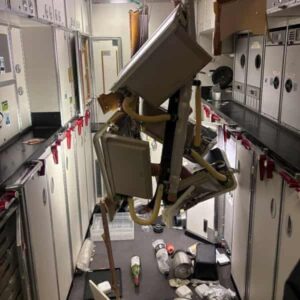
A British passenger has died and seven people have been critically injured after a flight from London to Singapore was hit by turbulence.
Passengers onboard the Singapore Airlines plane told of a “dramatic drop” that launched those not wearing a seatbelt into the cabin ceiling.
The airline said the Boeing 777 carrying 211 passengers – mostly from Australia, Britain, New Zealand or Singapore – and 18 crew members encountered severe turbulence on its way from Heathrow. The aircraft was diverted to Bangkok, where it landed at 3.45pm local time (0945 BST) on Tuesday.

Neighbours paid tribute to Geoffrey Kitchen, from Thornbury, Gloucestershire, on Tuesday night. The retired insurance professional with a “passion for theatre”, died after leaving from Heathrow on Monday night.
Kitchen, 73, and his wife were on their way to a holiday in Australia via Singapore, neighbours told the Guardian. According to Thai authorities, he had a heart condition and probably had a heart attack.
Scientists have warned of increased turbulence, particularly “clear air turbulence” which is harder to detect or forecast, as global heating warms air at higher altitudes and makes weather more unpredictable.
At a press conference, Kittipong Kittikachorn, the general manager of Airports of Thailand confirmed that one person had died and that seven were in a critical condition, mostly with head injuries. Twenty-three passengers, plus one crew member, had less severe injuries, he said.
“The incident happened during meal service, about two to three hours before the flight was due to land in Singapore,” he added. “It was probably during breakfast service. Most of the passengers had fastened their seatbelts.”
Emergency services met the plane at Bangkok’s Suvarnabhumi airport. A local police officer at Samitivej Srinakarin hospital in Bangkok, where the injured were brought, said he had seen about 70 wounded people, including some with very minor conditions. Some patients requested to be taken to another hospital. One man was brought out on a stretcher to be transferred via ambulance. Another was brought out in a wheelchair.
In a statement, the airline said: “Flight SQ321 encountered sudden extreme turbulence over the Irrawaddy basin … The pilot declared a medical emergency and diverted the aircraft to Bangkok.
“Singapore Airlines offers its deepest condolences to the family of the deceased. We deeply apologise for the traumatic experience that our passengers and crew members suffered on this flight. We are providing all necessary assistance during this difficult time. We are working with our colleagues and the local authorities in Thailand to provide the necessary assistance.”
One passenger on the flight, Dzafran Azmir, a 28-year-old student, told Reuters: “Suddenly the aircraft starts tilting up and there was shaking so I started bracing for what was happening, and very suddenly there was a very dramatic drop so everyone seated and not wearing a seatbelt was launched immediately into the ceiling.
“Some people hit their heads on the baggage cabins overhead and dented it. They hit the places where lights and masks are and broke straight through it.”
Another passenger, named only as Andrew from London, told BBC Radio 5 Live: “During the few seconds of the plane dropping there was an awful screaming and what sounded like a thud.”
He said he had been covered in coffee during the incident, and that once the turbulence had settled he helped a woman “screaming in agony” who had a “gash on her head”.
Thai immigration police said medical personnel had boarded the plane to assess injuries, and uninjured passengers had disembarked.
Singapore Airlines later confirmed the nationalities of the passengers onboard as 56 from Australia, two from Canada, one from Germany, three from India, two from Indonesia, one from Iceland, four from Ireland, one from Israel, 16 from Malaysia, two from Myanmar, 23 from New Zealand, five from the Philippines, 41 from Singapore, one from South Korea, two from Spain, 47 from the United Kingdom and four from the US.
Passengers were being kept in a special part of Suvarnabhumi airport and given dinner, before a new Thai Airways flight carrying on those able to travel was expected to take off for Singapore later on Tuesday evening.
Singapore Airlines said it was working with relevant authorities on the investigation into the incident. The airline has not suffered any major incidents in recent years.
The 777-300 aircraft manufacturer, Boeing, said it “stood ready to support” Singapore Airlines. Although the manufacturer’s planes have suffered a number of recent malfunctions, there is no suggestion of any fault involved in an incident caused by turbulence. Boeing added: “We extend our deepest condolences to the family who lost a loved one, and our thoughts are with the passengers and crew.”
Deaths caused by turbulence are extremely rare on international scheduled flights, but severe injuries have occurred – more often to crew. There have been deaths on smaller private jets, although usually only when the turbulence has led to a crash.
Weather conditions in the region have been associated with turbulence in the past. Two crew onboard a British Airways flight returning from Singapore to London in June 2023 sustained broken legs after being thrown around the cabin during severe turbulence over the Bay of Bengal.
Joji Waites, the head of flight safety at the pilots’ union Balpa, said: “Aircraft are designed and certificated to withstand flight in severe turbulence, and pilots are trained in how to anticipate potential turbulence encounters based on weather forecasts and the aircraft’s onboard technology.”
He said forecasts could not identify specific instances of turbulence, though, adding that passengers should “comply promptly with fasten seat belt signs when asked to do so”.
• This article was amended on 22 May 2024 to remove a reference to the aircraft having descended 6,000ft over three minutes, which was part of emergency landing preparations and not the cause of injuries.